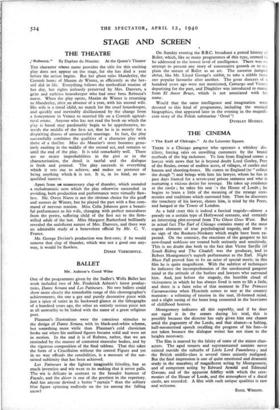STAGE AND SCREEN
THE THEATRE
Rebecca." By Daphne du Manner. At the Queen's Theatre.
THE character whose name provides the title for this exciting play does not appear on the stage, for she has died a year before the action begins. But her ghost rules Manderley, the Cornish home of Maxim de Winter, as efficiently as she her- self did in life. Everything follows the methodical routine of her day, her rights jealously preserved by Mrs. Danvers, a grim and ruthless housekeeper who had once been Rebecca's nurse. When the play opens, Maxim de Winter is returning to Manderley, after an absence of a year, with his second wife. His wife is a timid child, no match for the cruel housekeeper, and quickly and inevitably disillusioned by the change from a honeymoon in Venice to married life on a Cornish agricul- tural estate. Anyone who has not read the book on which the pay is based may pardonably begin to be apprehensive, to- wards the middle of the first act, that he is in merely for a dispiriting drama of unsuccessful marriage. In fact, the play successfully combines the qualities of a character play with thoe of a thriner. Miss du Maurier's story becomes genu- inely exciting in the middle of the second act, and remains so until the end of the play. It is told remarkably well. There are no major improbabilities in the plot or in the characterisation, the detail is tactful and the dialogue is fresh and pointed. The play succeeds in everything which it sets out to achieve, and makes no pretence of being anything which it is not. It is, in its kind, an un- qualified success.
Apart from an unnecessary clap of thunder, which sounded a melodramatic note which the play otherwise succeeded in avoiding, both production and performance were virtually flaw- less. Mr. Owen Nares is not the obvious choice for the gruff and austere de Winter, but he played the part with a fine com- mand of nervous tension. Miss Celia Johnson gave a beauti- ful performance as his wife, changing with perfect naturalness from the pretty, suffering child of the first act to the firm- willed adult of the last. Miss Margaret Rutherford brilliantly revealed the maleficent nature of Mrs. Danvers, and there was an admirable study of a benevolent official by Mr. C. V. France.
Mr. George Devine's production was first-rate; if he would remove that clap of thunder, which was not a good one any- way, it would be flawless.
DEREK VERSCHOYLE.


































 Previous page
Previous page